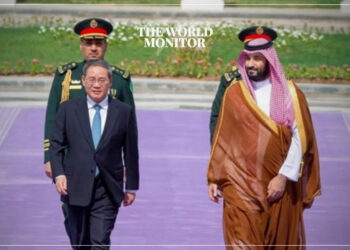French Foreign Minister Catherine Colonna embarked on a brief visit to Beijing, where she emphasized the need for Chinese authorities to remain vigilant against any contributions to Russia’s war efforts in Ukraine.
Colonna’s trip primarily aims to rekindle dialogue on Franco-Chinese exchanges, which were suspended during the COVID-19 pandemic.
During her visit, Colonna announced new measures regarding visas and agreements in culture, research, and health sectors. This visit also provided an opportunity to discuss ongoing conflicts, with France hoping to see a more active role from China.
In a press conference with her Chinese counterpart, Wang Yi, Colonna expressed a desire for in-depth dialogue with China on global challenges and major crises, including “the ongoing Russian war of aggression in Ukraine.”
However, she acknowledged that these issues had not yet been discussed during the visit.
Colonna emphasized the importance of China’s vigilance to ensure that no entity, especially in the private sector, contributes directly or indirectly to Russia’s illegal war efforts.
She underlined that “cooperation with China in this conflict is necessary to promote just and lasting peace.”
Colonna’s visit coincided with the commencement of a four-day ceasefire between Israel and Hamas, allowing for the exchange of hostages held in the Gaza Strip (50 hostages) for Palestinian prisoners in Israeli jails (150 prisoners) in phases.
She stressed the need for the release of all hostages, not just 50.
Reminding her hosts, including Prime Minister Li Keqiang, of the international responsibilities borne by China and France as permanent members of the Security Council, Colonna attended the “High-Level Franco-Chinese Dialogue on Human Exchanges” at Peking University with Wang Yi.
This dialogue, initiated in 2014 and temporarily paused during the pandemic, aims to discuss academic, scientific, cultural, sports exchanges, tourism, and gender equality issues.
In line with Colonna’s visit, Beijing announced that from December 1, French tourists could travel to China without a visa for stays under 15 days.
Wang Yi expressed eagerness to see more mutual visits and exchanges as China reopens its borders after nearly three years of COVID-19 closures. Colonna welcomed this announcement as a significant facilitation of movement between the two countries.
Additionally, the ministers launched the Franco-Chinese Center for Carbon Neutrality, aimed at enhancing scientific and technological cooperation and funding joint research programs.
Colonna stated, “A week before the COP28 climate conference, there is no better way to affirm our countries’ ambition regarding the climate.”
Other agreements included renewing the partnership between the Pompidou Center and the West Bund Museum in Shanghai for five years, focusing on art loans and organizing exhibitions.
The two countries also signed an educational cooperation agreement, particularly aimed at enhancing the teaching of the French language in China.
Since France’s recognition of the People’s Republic of China in 1964 under General de Gaulle, Beijing has viewed Paris as a more independent interlocutor compared to other Western nations, especially regarding its approach to the United States.






